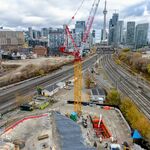Fresh Start
Banned
I didn't see this mentioned anywhere else so:
http://www.newswire.ca/en/releases/archive/April2010/30/c7252.html
MoneySense magazine ranks every town or city with a population of 10,000 or more on such factors as jobs, house prices, weather and crime rates. Visit newsstands or http://www.moneysense.ca/bestplaces2010
TORONTO, April 30 /CNW/ - It may not have the flash of Montreal or Vancouver's balmy winters, but when it comes to overall livability, Ottawa-Gatineau is tops. The capital city moved back into the coveted slot on MoneySense magazine's Best Places to Live ranking, after being knocked from its perch by Victoria in 2009.
The mix of stagnant salaries and skyrocketing housing prices helped push Victoria out of first place this year, while Ottawa's seemingly recession-proof civil service, low crime rate, affluence and growth propelled it into the top spot, where it has now resided for three out of the five annual rankings. And while Canadian big cities may seem like they are THE places to live, their rankings were modest: Vancouver ranked 29th, Toronto 85th, and Montreal was 120th out of 179.
The MoneySense rankings are based on hard data factors that contribute to a city's livability. These indicators range from climate and ease of travel to affordable housing and population growth. Every city or town in the country with a population of 10,000 or more is ranked, and this year, for the first time, MoneySense separated out all suburbs of at least 50,000 people, which added 25 new cities to our survey.
"This isn't about tourist attractions, nightlife or beautiful scenery," says MoneySense editor Duncan Hood. "It's about the places that Canadians can best earn a living, live comfortably and safely and enjoy the fruits of their labour."
Canada's Best Places to Live - Top 10
1. Ottawa-Gatineau
2. Kingston, Ont.
3. Burlington, Ont.
4. Fredericton, N.B.
5. Moncton, N.B.
6. Repentigny, Que.
7. Brandon, Man.
8. Victoria, B.C.
9. Winnipeg, Man.
10. Levis, Que.
Highlights:
The sunshine factor: It turns out the happy medium for Canadian weather is Southern Ontario. Of the top 20 point-getters when it comes to climate factors, 19 are in that region. Also, most of the cities that ranked highest for fewest days with rain or snow were, not surprisingly, in Alberta or Saskatchewan.
Nice house if you can get it: Vancouver is now the most unaffordable city in Canada by far when it comes to house prices, causing it to tumble in the rankings. But other cities such as Moncton, Fredericton and Brandon, Man., consistently do well, mainly because of their ability to maintain reasonably priced housing.
The suburban edge: Toronto suburbs Markham, Whitby and Newmarket, Ont., along with several other communities bordering major cities, scored high on prosperity because they enjoy the high salaries of Toronto's job market without the sky-high housing costs of the city proper.
About MoneySense:
MoneySense is Canada's personal finance and lifestyle magazine. Packed with smart features, practical advice and easy-to-follow financial tips on everything from home improvement to mutual funds, Moneysense attracts Canadians nationwide on the lookout for new ways to save, invest and spend. MoneySense.ca is Canada's best all-around personal finance website.
---
I think that statement above needed emphasis because far too often Torontonians tend to live their lives in a fishbowl, under the illusion that this city is either doing fine now or will head in the right direction eventually and thus lack the drive necessary to demand better from our elected officials. I combed through the list myself and here's how the GTA in general ranked (Aurora's notably absent from their list):
http://www.newswire.ca/en/releases/archive/April2010/30/c7252.html
MoneySense magazine ranks every town or city with a population of 10,000 or more on such factors as jobs, house prices, weather and crime rates. Visit newsstands or http://www.moneysense.ca/bestplaces2010
TORONTO, April 30 /CNW/ - It may not have the flash of Montreal or Vancouver's balmy winters, but when it comes to overall livability, Ottawa-Gatineau is tops. The capital city moved back into the coveted slot on MoneySense magazine's Best Places to Live ranking, after being knocked from its perch by Victoria in 2009.
The mix of stagnant salaries and skyrocketing housing prices helped push Victoria out of first place this year, while Ottawa's seemingly recession-proof civil service, low crime rate, affluence and growth propelled it into the top spot, where it has now resided for three out of the five annual rankings. And while Canadian big cities may seem like they are THE places to live, their rankings were modest: Vancouver ranked 29th, Toronto 85th, and Montreal was 120th out of 179.
The MoneySense rankings are based on hard data factors that contribute to a city's livability. These indicators range from climate and ease of travel to affordable housing and population growth. Every city or town in the country with a population of 10,000 or more is ranked, and this year, for the first time, MoneySense separated out all suburbs of at least 50,000 people, which added 25 new cities to our survey.
"This isn't about tourist attractions, nightlife or beautiful scenery," says MoneySense editor Duncan Hood. "It's about the places that Canadians can best earn a living, live comfortably and safely and enjoy the fruits of their labour."
Canada's Best Places to Live - Top 10
1. Ottawa-Gatineau
2. Kingston, Ont.
3. Burlington, Ont.
4. Fredericton, N.B.
5. Moncton, N.B.
6. Repentigny, Que.
7. Brandon, Man.
8. Victoria, B.C.
9. Winnipeg, Man.
10. Levis, Que.
Highlights:
The sunshine factor: It turns out the happy medium for Canadian weather is Southern Ontario. Of the top 20 point-getters when it comes to climate factors, 19 are in that region. Also, most of the cities that ranked highest for fewest days with rain or snow were, not surprisingly, in Alberta or Saskatchewan.
Nice house if you can get it: Vancouver is now the most unaffordable city in Canada by far when it comes to house prices, causing it to tumble in the rankings. But other cities such as Moncton, Fredericton and Brandon, Man., consistently do well, mainly because of their ability to maintain reasonably priced housing.
The suburban edge: Toronto suburbs Markham, Whitby and Newmarket, Ont., along with several other communities bordering major cities, scored high on prosperity because they enjoy the high salaries of Toronto's job market without the sky-high housing costs of the city proper.
About MoneySense:
MoneySense is Canada's personal finance and lifestyle magazine. Packed with smart features, practical advice and easy-to-follow financial tips on everything from home improvement to mutual funds, Moneysense attracts Canadians nationwide on the lookout for new ways to save, invest and spend. MoneySense.ca is Canada's best all-around personal finance website.
---
I think that statement above needed emphasis because far too often Torontonians tend to live their lives in a fishbowl, under the illusion that this city is either doing fine now or will head in the right direction eventually and thus lack the drive necessary to demand better from our elected officials. I combed through the list myself and here's how the GTA in general ranked (Aurora's notably absent from their list):
- 3 Burlington
- 15 Newmarket
- 26 Mississauga
- 30 Clarington
- 32 Oakville
- 48 Oshawa
- 51 Pickering
- 55 Vaughan
- 56 Whitby
- 61 Ajax
- 62 Milton
- 66 Halton Hills
- 74 Caledon
- 77 Hamilton
- 85 Toronto
- 89 Barrie
- 97 Richmond Hill
- 118 Markham
- 140 Brampton




